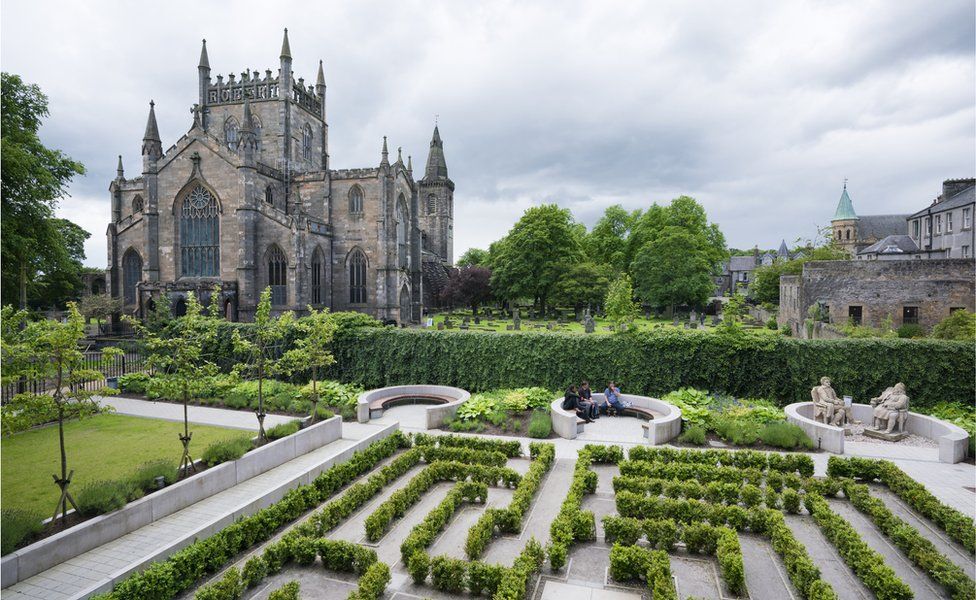Dunfermline to become Scotland's eighth city
- Published

Dunfermline is to become Scotland's eighth city after being granted the status as part of the Queen's Platinum Jubilee celebrations.
The town in Fife was chosen along with seven others across the UK and overseas territories.
It joins Glasgow, Edinburgh, Aberdeen, Dundee, Perth, Stirling and Inverness on the list of Scottish cities.
Dunfermline, which was once Scotland's capital, was the birthplace of Charles I and philanthropist Andrew Carnegie.
About 40 locations applied for city status and were evaluated by a panel of experts and Cabinet Office ministers, before a recommendation was put to the Queen.
They were judged on their royal associations and cultural heritage, as well as the uniqueness of their communities and distinct local identity.
Dunfermline was successful in its bid alongside Bangor in Northern Ireland, Colchester, Doncaster and Milton Keynes in England, Douglas in the Isle of Man, Stanley in the Falkland Islands and Wrexham in Wales.
Fife provost Jim Leishman - the colourful former manager of local football team Dunfermline Athletic whose name has become synonymous with the town - said he hoped its new city status would help Dunfermline grow economically, and attract more tourism to the city and its surrounding area.
Fife provost Jim Leishman and other local people welcome Dunfermline's city status
He said: "It's fantastic. The people of Dunfermline are so proud of the achievement. It's a great honour.
"Dunfermline is a great place, one of the best places in Scotland to come and visit. Everyone will be so excited."
He added: "Perth was the last town to become a city and I think their economy has increased by 12%. That's fantastic news for our shop owners and businesses."
The competition for city status has taken place in each of the last three jubilee years but this year a record number of awards were given out.
This was also the first time the competition was open to applications from the Crown Dependencies and Overseas Territories.
Dunfermline - The ancient capital of Scotland
- Dunfermline's most famous son is Andrew Carnegie, whose steel industry helped build America
- His philanthropy started the world's public library system, and he gave away the equivalent of £5.5bn in today's money
- Its annual fireworks display attracts some 30,000 local people, while the Christmas light event packed the town centre with 10,000 people
- Dunfermline, with a population of 58,508, was one of the seats of the kings of Scotland in the middle ages and is known as the "ancient capital of Scotland"
- Robert the Bruce - who defeated the English army at the Battle of Bannockburn - was buried in Dunfermline Abbey after his death in 1329
Royal connections
The new city was first recorded in the 11th Century with the marriage of Malcolm III, King of Scots, and Saint Margaret at the church in Dunfermline, which evolved into the A-listed abbey.
Dunfermline Abbey was later established as a royal mausoleum for the Scottish Crown with a total of 18 royals, including seven kings buried there - from Queen Margaret in 1093 to Robert Stewart, Duke of Albany, in 1420.
Robert The Bruce, otherwise known as Robert I, became the last of the seven Scottish kings to be buried there in 1329 - although his heart was taken to Melrose - and his name is carved into the top of Dunfermline Abbey.
A number of British monarchs were born in Dunfermline Palace. These include David II of Scotland, who was the son of Robert The Bruce, James I of Scotland and Charles I, who was King of England, Scotland, and Ireland from 1625 until his execution in 1649.
The Union of the Crowns in 1603 ended Dunfermline's town's connections when James VI relocated the Scottish Court to London.
Philanthropist Andrew Carnegie was born in Dunfermline in 1835 and went on to lead the expansion of the American steel industry, becoming one of the richest Americans in history.
During the last 18 years of his life, he gave away about $350m (£280m) - roughly worth $5.5bn (£4.4bn) in 2021 - to charities, foundations and universities. This was almost 90% of his fortune.
He donated the Pittencrieff Estate to the town, later to be converted into Pittencrieff Park, as well as a free library and public swimming baths.
Notable people from popular culture who were born or grew up in Dunfermline include the new Dr Who, Ncuti Gatwa, who attended Dunfermline High School after moving from Rwanda as a refugee.
Singer Barbara Dickson, Jethro Tull's frontman Ian Anderson, and Nazareth's Pete Agnew were all born in Dunfermline.
Big Country singer Stuart Adamson moved there from nearby Crossgates as a teenager, while film director and former Skids frontman Richard Jobson also attended Dunfermline High School.
Critically acclaimed author Iain Banks, and poet and novelist John Burnside are also from Dunfermline.
Scottish Secretary Alister Jack congratulated Dunfermline on its new status, adding: "Being awarded city status can give places a real boost, from helping grow the local economy, to raising its profile, to instilling civic pride.
"For a place with such rich royal history, it is fitting that Dunfermline is becoming a city as we celebrate our longest-serving monarch's Platinum Jubilee. Its lovely green spaces and fantastic cultural attractions will ensure that this new city thrives well into the future."
Perth had been Scotland's newest city, having been granted city status in 2012, with Stirling having been given the status in 2002 and Inverness in 2000.
The Scottish bids that missed out this time around were Dumfries, Elgin, Greenock, Livingston, Oban, St Andrews and South Ayrshire.
Perth and Inverness also submitted entries to secure Lord Provost or Lord Mayor status but that title was granted to Southampton.
"Letters Patent" will now be prepared and will be presented to winners later in the year.
- Published20 May 2022
- Published23 December 2021
- Published15 March 2012